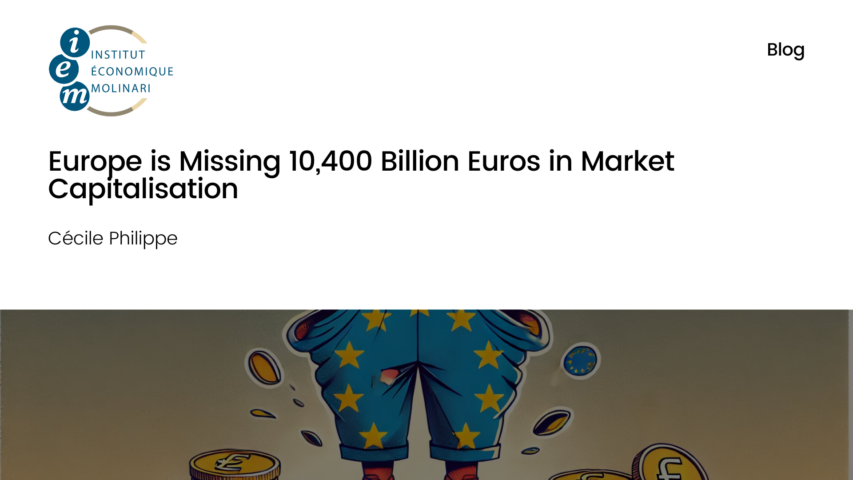Europe is Missing 10,400 Billion Euros in Market Capitalisation

Europe is Missing 10,400 Billion Euros in Market Capitalisation
Cécile Philippe // 4 September 2023
The need for sovereignty – digital, technological, medical, energy, or food – has become a priority, at least in the discourse. It is evident that Europe has become extremely dependent on others for access to essential goods and services. Yet, recent years have shown just how problematic dependencies can be when circumstances change radically due to underlying geopolitical or health-related tensions. The conclusion, therefore, seems unanimous. However, proposals to address the issue do not seem to grasp the scale of the problem; namely, Europe’s staggering lack of capital.
Digital dependency is no myth; in fact, it is extreme. Unsurprisingly, the Digital Dependency Index (DDI) published by the University of Bonn placed Europe’s degree of dependence at around 0.8 (with 0 for total independence and 1 for absolute dependence). This is a very high dependence level, with foreign digital technologies taking a dominant position. Similarly, Europe pales in comparison to the US in the race to first produce Covid-19 vaccines. Two American companies benefitting from a complete innovation financing ecosystem – from venture capital to the stock market – were able to produce vaccines in record time. The same can be said of telecoms. Europe appears to be lagging behind the US and leading Asian countries when it comes to establishing next-generation networks such as 5G.
This dependence is closely linked to a lack of capital. In the first industrial revolution, the favourable positions of Britain and France were linked to a significant stock of savings, which were channelled into the infrastructure (canals, railroads, etc.) and industry of the time. Today, it is this stock of long-term savings that is sorely missing to finance the ‘investment walls’ needed for innovation in communication and information technologies (ICT), the energy transition, and medical innovation.
According to our calculations at the Institut Économique Molinari, Europe is missing €10,400 billion in market capitalisation. At the end of 2020, corporate market capitalisation represented 70 per cent of the GDP in the EU, compared with an OECD average of 147 per cent. Until now, Europe has refused to address this structural problem. Instead, it attempts temporary solutions in the form of limited-scale plans to support innovation or projects aimed at establishing new ways of sharing value. In particular, Europe is considering implementing a new regulation that will allow the struggling telecom sector to charge big digital companies for the data they transmit through their networks.
All these approaches fail to address the crucial question: How can we channel European savings into future projects? Abundant savings boosted European growth in 1890–1914, leading to a boom in chemicals, electricity, automobiles, and then, aeronautics. The shortage of long-term savings explains our decline today and the brazen success of the US and numerous other countries.
If South Korea shows relative digital independence, it is because, as Maximilian Mayer, author and international relations professor, explains, ‘the South Korean government began investing in ICT in the 1980s, through massive, targeted investments in basic research’. Market financing of companies then took over, and in 2020, corporate market capitalisation represented 132 per cent of the GDP – twice the share in Europe.
By the end of 2020, the total capitalisation of EU stock exchanges stood at €9,900 billion. This was four times lower than that of the US stock exchanges (€37,700 billion for the NYSE plus Nasdaq). The leading EU stock exchange, Euronext, was four times smaller than the NYSE (traditional US equities) and three times smaller than the Nasdaq (technology equities).
If Europe is falling behind, it is because we lack pension funds, which hold 30 per cent of the $100,000 billion invested in the stock market. Compared with the OECD average, the EU had a shortfall of €8,900 billion in long-term savings at the end of 2020. Pension funds represented 34 per cent of the GDP at the end of 2021 in Europe, compared with the OECD average of 100 per cent.
As they are long-term players, with capital invested for years or even decades, pension funds play a major role in supporting innovation worldwide. They make it possible to finance lengthy ‘production detours’ – projects that promise a bright future but won’t be profitable for years.
The lack of innovation in Europe is not a skills problem (we have the tools and the know-how), but the consequence of a problem of outlets linked to the scarcity of long-term savings, resulting from a series of ill-advised regulatory choices that have made retirement savings scarce. Although a significant proportion of retirement benefits globally are financed by collective or individual capitalisation, invested in part in the local economic fabric, the EU benefits less from this windfall.
Pension schemes – long-term investors – cannot be replaced by state support schemes or more-or-less informed attempts to alter the division of value. Given the financial masses required to invest in technologies capable of sustaining today’s societies, it is illusory to hope for independence and development without capital. We urgently need to rethink pension schemes, adding a dose of collective capitalisation wherever it is missing. This is essential for economies, innovation, and future retirees.
The original article was published in L’Express and translated by Sangeeta Unnikrishnan.
Download or share this blog post
EPICENTER publications and contributions from our member think tanks are designed to promote the discussion of economic issues and the role of markets in solving economic and social problems. As with all EPICENTER publications, the views expressed here are those of the author and not EPICENTER or its member think tanks (which have no corporate view).



